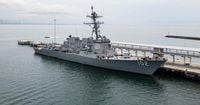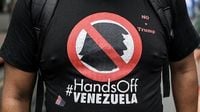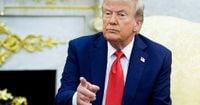On September 2, 2025, the United States military launched a deadly strike on a vessel in the southern Caribbean, instantly thrusting U.S.-Venezuela relations into a new and volatile phase. The targeted boat, allegedly operated by members of the Venezuela-based Tren de Aragua gang, was reportedly heading toward Trinidad and Tobago with drugs thought to be destined for U.S. shores. Eleven people aboard were killed, and the action—ordered directly by President Donald Trump—was quickly made public in a video posted by the president himself on Truth Social.
The aftermath of this dramatic event has rippled far beyond the Caribbean Sea. U.S. Secretary of State Marco Rubio, speaking during a press conference in Mexico City the following day, made it clear that the strike was not an isolated incident. “Instead of interdicting [the vessel], on the president’s orders, we blew it up,” Rubio stated, according to Reuters. He added ominously, “And it’ll happen again. Maybe it’s happening right now.”
This bold new approach represents a significant escalation in the U.S. strategy against Latin American criminal organizations. The Trump administration has repurposed the rhetoric and tactics of the post-9/11 “Global War on Terror,” labeling select Latin American cartels as “foreign terrorist organizations” and “narco-terrorists.” The designation increases penalties for collaborators and expands legal mechanisms for sanctions and surveillance, but does not, in itself, grant the president sweeping new military powers. Nevertheless, the administration’s actions suggest a willingness to interpret existing authorities aggressively—and publicly.
Defense Secretary Pete Hegseth, appearing on Fox News the day after the attack, reinforced the administration’s message. He described the strike as part of a “deadly serious mission” against drug traffickers and warned that similar actions would follow. “Anyone else trafficking in those waters who we know is a designated narco-terrorist will face the same fate,” Hegseth asserted.
President Trump, for his part, did not shy away from the spectacle. “There were massive amounts of drugs coming into our country to kill a lot of people, and everybody fully understands that,” he said from the White House, echoing the administration’s justification for the use of deadly force. The president’s decision to post video footage of the strike on social media was a deliberate move to amplify the message—both to criminal organizations and to political audiences at home and abroad.
Yet for many observers, the strike raised more questions than it answered. Brian Finucane, a senior adviser for the U.S. program at the International Crisis Group, criticized the operation as a “performative and gratuitous use of military power.” He told Al Jazeera, “For decades, the U.S. Navy and Coast Guard worked together on interdicting vessels, stopping them at sea, taking the purported smugglers into custody and prosecuting them through law enforcement channels. There is no indication of why that wasn’t possible here. So the blowing up of this vessel was entirely unnecessary. It was also literally performed in the sense that Trump posted on Truth Social a video of the attack, essentially a snuff film.”
Finucane and other analysts caution that the administration’s approach risks normalizing extrajudicial military action in the Western Hemisphere—a region long wary of U.S. intervention. The legal justification for the strike remains murky. Throughout the “Global War on Terror,” presidents have cited a mix of executive authority and Congressional resolutions, particularly the 2001 Authorization for Use of Military Force (AUMF), to justify strikes outside active war zones. However, the AUMF was intended to target those responsible for the September 11 attacks, and legal experts argue that it does not apply to groups like Tren de Aragua. “Being a drug smuggler, by itself, does not render you a combatant or an enemy fighter,” Finucane explained. “And if they don’t fall into that category for law of war purposes, then they’re civilians. And the intentional targeting of civilians is a war crime.”
The Trump administration has yet to clarify its domestic legal rationale. This ambiguity has not gone unnoticed in Congress. While some Republican leaders have praised the strike—Senate Foreign Relations Chairman Jim Risch called it “decisive action towards these criminals,” and Senator Tom Cotton hailed the attack on “terrorists”—Democrats have demanded immediate briefings and a clear legal explanation. The ranking member of the House Foreign Affairs Committee called on the administration to “brief Congress immediately and spell out its legal justification, if they have one, for this strike.”
The international response has been equally charged. Venezuelan President Nicolás Maduro, already locked in a bitter standoff with Washington, declared on September 1 that his country was at “maximum preparedness” to defend itself and threatened to declare a “republic in arms” if attacked. According to the Associated Press, Colombian President Gustavo Petro, a Maduro ally, described the U.S. strike as a “murder.” These reactions underscore the risk of regional escalation and the potential for unintended consequences.
The Trump administration’s campaign against Maduro has intensified in recent months. In August, the administration doubled the reward for Maduro’s arrest to $50 million, accusing him of using criminal gangs to traffic drugs into the United States. Rubio has been especially vocal, stating that Maduro “MUST be brought to justice,” and the administration has attempted to tie the Venezuelan regime to criminal organizations, including the Cartel de Los Soles, which the U.S. Treasury designated as a Specially Designated Global Terrorist group in July.
Yet, the intelligence linking Maduro’s regime directly to the Tren de Aragua’s operations in the U.S. is disputed. Axios reported that a partially declassified intelligence memo found Maduro’s government was “probably not directing” TDA movement into and within the U.S. Top National Intelligence Council officials were reportedly ousted after the release of this assessment, highlighting internal disagreement over the administration’s narrative.
Beyond the military and diplomatic brinkmanship, the strike has spilled into other contentious areas of U.S. policy. The Trump administration has attempted to invoke the Alien Enemies Act of 1798 to accelerate deportations of Venezuelan migrants suspected of gang ties, but a federal appeals court ruled against this use on September 2, finding “no invasion or predatory incursion” had occurred. Meanwhile, the U.S. Supreme Court granted the administration authority to strip temporary deportation protections from some 350,000 Venezuelans while legal battles continue, reversing earlier Biden-era extensions.
Oil, too, remains a friction point. Earlier this year, President Trump canceled a Chevron oil deal in Venezuela to secure votes for his tax and spending bill, a move seen as both a nod to anti-Maduro hardliners and a strategic calculation in the broader U.S.-Venezuela standoff. Rubio, a long-time opponent of Maduro’s regime and a prominent figure in Miami’s anti-socialist Cuban exile community, has continued to insist, “Maduro is NOT the President of Venezuela and his regime is NOT the legitimate government.”
As the dust settles, the U.S. strike in the Caribbean stands as a stark signal of the Trump administration’s willingness to use military force far from traditional battlefields—and to do so in the full glare of public attention. Whether this marks a new normal in U.S. counter-narcotics policy or a dangerous escalation with unpredictable consequences remains to be seen. What’s certain is that the world is watching closely as the boundaries of American power are tested once again.



